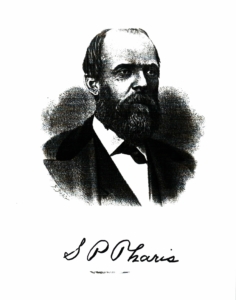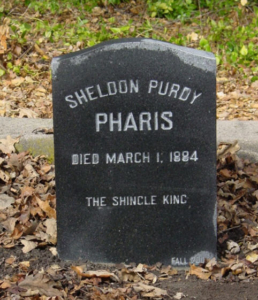Sheldon Purdy Pharis

Sheldon Purdy Pharis
Date of Birth: 22 Mar 1829
Born In: New York
Age: 55
Occupation: Millsman
Marital Status: Single
Died: 1 Mar 1884
Cause of Death: Suicide by gunshot
Death Location: Woodside
Burial Plot: 146
FindaGrave ID: 129178230

Obituary
A FATAL SHOT!
"Fired by His Own Hand with Suicidal Intent."
The Times and Gazette Saturday, March 8, 1884
A full Account of the Recent Death of Sheldon P. Pharis -
Statements of Witnesses -
The Funeral
On Saturday morning last, news was brought to town that S. P. Pharis, an old and highly respected citizen of this county, had committed suicide at his residence on the mountains some three of four miles beyond Summit Springs. At first it was rumored that he was dangerously wounded, but later reports confirmed the statement that Mr. Pharis was dead. As soon as was possible Coroner Loveland repaired to the scene of the death, and hastily summoned a jury composed of the following named citizens, all of whom are residents in that neighborhood and personal acquaintances of the deceased: Alfred Brackett, Alfred Fay, W. W. Durham, Alexander Monroe, John Shutts, David H. Muny, Frank C. Gilbert.
The only witnesses that were examined at the inquest were Hiram D. Haskins and Emanuel Stephens. Mr. Haskins has for some years past been a near neighbor to Mr. Pharis, and Mr. Stephens was an old friend, and at the time of the suicide was visiting the deceased. From the testimony given by these two men at the inquest, and what has been observed by those who had been intimately acquainted with Mr. Pharis, there is no reason to doubt that at the time of his death and some previous thereto, he was bordering on insanity.
Dr. R. O. Tripp, of Woodside, was interviewed by a GAZETTE reporter, and he tells of what transpired between himself and Mr. Pharis on the day before the act was committed. Hiram Haskins came to Woodside, sought Dr. Tripp, and informed him that Purdy was acting in a very strange manner, and that as he (Tripp) was an old acquaintance of Mr. Pharis, he might be able to do something for him. Dr. Tripp tried to induce Mr. Pharis to come to Redwood and consult a physician, knowing him to be suffering for some time past with neuralgia, and to that ailment he attributed his mysterious actions. After many fruitless efforts to gain his point, Dr. Tripp finally abandoned the scheme. He talked to Mr. Pharis, endeavored to calm him, and having succeeded, as he supposed, he departed for his home. The next morning he heard of Mr. Pharis' death. From the statements of Mr. Haskins and Mr. Stevens the following facts are allotted: Mr. Pharis had been acting in a strange manner for about a month, and his actions were such as to show that his mind was to some extent impaired. In his conversation he would repeat his questions a number of times, and quite often could not be induced to talk at all. At one time he told Haskins that he (Pharis) was going to pieces, and that was the reason why he did not like to be left alone. He imagined that people were watching him; that the editors of the Redwood City newspapers were publishing articles about him, although they did not use his name, but their object was to damage his character. He could not sleep and would spend the night talking to himself. On the evening prior to his death, both Mr. Haskins and Mr. Stevens say that Mr. Pharis retired in apparently a better state of mind than usual.
Mr. Pharis' house is so situated that from the rooms occupied by the two witnesses anything might easily be heard that transpired in that which the deceased slept. During the fore part of the evening in question the two men heard noises in the other part of the building. This noise they supposed to be caused by the dropping of a boot. They heard Mr. Pharis groaning, and when asked if he was ill, he replied that he was not. Nothing more was noticed of the deceased until the next morning. At about 5:30 o'clock Mr. Haskins arose, dressed himself and began to make preparations for breakfast. Shortly after Mr. Stevens arose. While the two men were together they heard groans, of sounds similar to one snoring, or breathing in a distressed manner in Pharis' room. The door was burst open and Mr. Pharis was discovered lying on the floor with his feet slightly drawn up. An examination disclosed a wound on top of his head, and a pistol lying close by. He was then in a dying condition. They being all the witnesses to be examined the evidence then closed, and the jury brought in a verdict that the deceased, Sheldon P. Pharis, came to his death from a pistol shot wound, fired by his own hand, and that the deed was done with suicidal intent. The remains were then conveyed to Redwood and deposited in James Crowe's undertaking establishment.
The death of S. P. Pharis has cast a gloom over the entire county. And expressions of sadness are everywhere noticeable. He is said by some to have been a man of a close and grasping disposition, which story is quickly set aside when one takes into consideration his many acts of charity, public beneficence, and personal favors. He was endowed with a kind heart, and a generous nature. In cases of need Mr. Pharis always responded heartily. One instance remarkable of his public spirit, which will over remain a monument to his generosity, was the building of the Pharis District school house, which Mr. Pharis had erected at his own expense, completed with a neat tower, in which was hung a splendid bell, making the building, though small, one of the nicest in the county. Mr. Pharis, of course possessed the usual characteristics of a man controlling a large business, he was shrewd and careful in all his dealings. Suffice it to say that he was honest - strictly honest, and more than that can be said of no man.
Sheldon Purdy Pharis was a native of Geddes, Onondagan County, New York. He was unmarried and at the time of his death was aged about 56 years. He was extensively engaged in the shingle business, and owned two large mills, thereby giving employment to a great many men, among whom, as well as all with whom he had dealings, he had gained a reputation of which one might be envied.
The funeral occurred on Sunday afternoon at 2 o'clock, the day following his death, at the Congregational Church. This large edifice was completely thronged with people. At the conclusion of the services, which were conducted by Rev. R. H. Sink, all that was mortal of S. P. Pharis was conveyed to its final resting place -- Union Cemetery. Judging from the number of carriages that followed the remains to the graveyard one could easily see that there was no lack of sympathy expressed, and the high regard in which the deceased was held was fully exemplified. Appended is the sermon in full, as delivered by Mr. Sink.
...
Our gleanings of facts have been meager. We collate and give them as follows: Sheldon Purdy Pharis, at the time of his death, 56 years of age, was borne in Onondagan Co., New York, March 22, 1829. He was educated at Syracuse State. He received the substantial training of the farm where he was brought up. He came in 1858, by the way of Panama, and landed on this Coast four years after the great excitement, which had not subsided then. He engaged in mining a few months, but finding poor encouragement, he came to this county, located on the mountains, which had been his home ever since - 30 years. He heart, was tender. Tho needs and sufferings of humanity appealed strongly to his sympathy which he manifested by help and aid. His feelings did no evanescence in sentiment; he rendered assistance when he felt it was needed. No one destitute called upon him in vain. His patriotic and public spirit - constant. His dealings - honorable. His debts he paid in full. His business relations with Hanson & Co., for over 23 years we always characterized by truth, honesty, honor. The little and trifling trickeries so prevalent among the acts of a multitude were beneath him. His habits - temperate. He was a man, either fortunately endowed by nature or one who had a marvelous self-government. Few unbound of every social tie, cut loose from the restraints of the home circle would thus, in the dignity of their manhood, single handed fight tho temptations, and escape the machination of the ______ of society, and .. ___ the pit-fallslying all along the pathway, especially of pioneer life. There is this in the history of the one we have bet to pay our last respects to today, that is worthy the imitation of all, especially young men....
Taciturn, except in business. Was never married, leaves no relatives in this State but one brother, two sisters in the East. His death was a sudden and severe shock to his friends, of whom, the number was almost unlimited. 'Twould be a misnomer to call him a suicide, for we are persuaded that his death was occasioned by the wild freak of a disordered brain. The cause for the dethronement of his reason may never be known. Gradually, for some time, has his mind been giving way. Did he become rational enough to realize the ...
Disordered reason pictured for our departed friend a scene of isolation; it deprived him of family and friends. What would be the happy emotions could he now with sound mind gaze upon the scene? Wandering reason may have bereft him of friends, yet friends he had, for the best testimony of esteem is such silent though eloquent tribute as you may now offer. Though no tender relative is here to-day to weep over his cold remains, that office without __________ is performed by those who not only weep with but for those that weep. Was he esteemed? Look at this assembly, feel the throbs, notice the falling tears. A scene to soften the stony heart of the misanthrope. But let not your tenderness end here; turn from the dead to the living; show kindness and charity to those about you...

